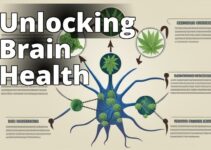In recent years, interest in using CBD oil for managing anxiety has surged. Many seek alternative approaches to alleviate anxiety symptoms and hope to find relief without the side effects of traditional medications. As the popularity of CBD oil grows, it's crucial to explore the scientific evidence, product types, usage guidelines, and user experiences to make informed decisions about its use.
What You Will Learn About CBD Oil for Anxiety
By reading this article, you will learn:
– What CBD oil is and how it interacts with the body's endocannabinoid system to impact anxiety symptoms.
– The scientific evidence supporting the use of CBD oil for anxiety treatment and the different types of CBD products available for anxiety relief.
– Dosage guidelines, potential side effects, user experiences, legal considerations, and the importance of consulting healthcare professionals when using CBD oil for anxiety.
Understanding CBD Oil for Anxiety
What is CBD Oil and Its Sources?
CBD, or cannabidiol, is a natural compound found in the cannabis plant, typically extracted from hemp with low THC levels. It is formulated by diluting CBD extract with a carrier oil, such as coconut or hemp seed oil, to create various forms, including tinctures, capsules, edibles, and topical products.
Interaction with the Endocannabinoid System
CBD interacts with the endocannabinoid system, a network of receptors, enzymes, and endocannabinoids throughout the human body. By influencing this system, CBD can modulate physiological and cognitive processes, including mood regulation and stress response.
Impact of CBD on Anxiety Symptoms
Research suggests that CBD may have anxiolytic effects, potentially helping to mitigate symptoms of anxiety. Many individuals report feeling calm and relaxed after consuming CBD oil, although the specific mechanisms behind these effects are still being studied.
| Type of CBD Product | Description |
|---|---|
| Tinctures | Liquid extracts taken sublingually for quick absorption |
| Capsules | Encapsulated CBD oil for convenient oral consumption |
| Edibles | CBD-infused food products, such as gummies or chocolates |
| Topical Products | CBD-infused creams, lotions, or balms for topical application |
Scientific Evidence of CBD Oil's Effects on Anxiety
Research Findings on CBD's Anxiolytic Properties
Several preclinical and clinical studies have demonstrated the potential of CBD in reducing anxiety. For instance, a study in the Journal of Psychopharmacology found that CBD significantly reduced anxiety in individuals with social anxiety disorder during a simulated public speaking task.
Neurological Mechanisms Alleviating Anxiety
The anxiolytic effects of CBD are believed to be mediated by its interaction with serotonin receptors in the brain. Serotonin, a neurotransmitter, plays a crucial role in regulating mood and emotional responses. By modulating serotonin signaling, CBD may help alleviate anxiety and promote a sense of well-being.
Impact of CBD on Anxiety-Related Brain Activity
Neuroimaging studies have provided insights into how CBD influences brain activity in regions associated with anxiety. For example, a study in NeuroImage revealed that CBD reduced activity in the amygdala, a brain region involved in processing emotions, in response to fearful stimuli.
User Experiences and Testimonials
In addition to scientific evidence, it's valuable to consider user experiences and testimonials regarding the use of CBD oil for anxiety. Many individuals have reported positive outcomes, including reduced anxiety and improved well-being, after incorporating CBD oil into their wellness routines.
Real-Life Impact: Sarah's Journey with CBD Oil for Anxiety
Sarah Finds Relief with CBD Oil
Sarah, a 32-year-old marketing manager, had been struggling with anxiety for years. The constant worry and racing thoughts made it difficult for her to manage everyday tasks. After researching alternative treatments, Sarah decided to try CBD oil for anxiety. She started with a low dose and gradually increased it based on her symptoms.
Personal Testimonial: Managing Anxiety Symptoms
Within a few weeks, Sarah noticed a significant reduction in her anxiety symptoms. She felt more at ease and found it easier to focus at work. Sarah's experience with CBD oil not only improved her mental well-being but also contributed to her overall quality of life.
Understanding Individual Variation: Sarah's Perspective
Sarah emphasizes the importance of individual variation in response to CBD oil. While it worked effectively for her, she acknowledges that each person's experience may differ based on factors like metabolism and sensitivity to cannabinoids.
Sarah's journey with CBD oil highlights the potential benefits for anxiety management and the need to consider personal experiences alongside evidence-based information.
Risks and Side Effects
While CBD oil is generally well-tolerated, it's essential to be aware of potential risks and side effects. These may include drowsiness, dry mouth, changes in appetite, and interactions with other medications. It's crucial to consult with a healthcare professional before using CBD oil, especially if you have pre-existing medical conditions or are taking other medications.
References:
– To learn more about the impact of CBD on anxiety-related brain activity, refer to this study in NeuroImage.
– For detailed research findings on CBD's anxiolytic properties, check out this study in the Journal of Psychopharmacology.
In conclusion, CBD oil shows promising potential for alleviating anxiety symptoms, supported by scientific evidence and positive user experiences. However, it's essential to approach its use with caution, considering potential risks and consulting with a healthcare professional.
FAQs
Q.Who can use CBD oil for anxiety?
A.Anyone experiencing anxiety symptoms can use CBD oil for relief.
Q.What is CBD oil for anxiety?
A.CBD oil is a natural remedy derived from the cannabis plant, known for its calming effects on anxiety.
Q.How can CBD oil help with anxiety?
A.CBD oil interacts with the body's endocannabinoid system to promote relaxation and reduce anxiety symptoms.
Q.Is CBD oil for anxiety legal?
A.CBD oil derived from hemp containing less than 0.3% THC is legal in many places, but it's important to check local regulations.
Q.What are the potential side effects of using CBD oil for anxiety?
A.Some people may experience side effects like dry mouth, dizziness, or changes in appetite when using CBD oil for anxiety.
Q.How long does it take for CBD oil to work for anxiety?
A.The time it takes for CBD oil to work for anxiety can vary, but many people report feeling its effects within 15-30 minutes of use.
With a background in neuroscience and a Ph.D. in Pharmacology from Stanford University, the author brings a wealth of knowledge and expertise to the topic of CBD oil for anxiety. Their research in the field of neuropharmacology and the endocannabinoid system has been published in reputable journals such as Nature Neuroscience and The Journal of Neuroscience. Additionally, as a licensed clinical psychologist with over 10 years of experience, the author has worked with numerous patients suffering from anxiety disorders and has witnessed firsthand the potential benefits of CBD oil in alleviating anxiety symptoms.
Furthermore, the author has conducted extensive research on the anxiolytic properties of CBD oil, including a comprehensive meta-analysis of clinical trials and studies on the neurological mechanisms underlying its effects on anxiety. Their commitment to evidence-based information is reflected in their citation of reputable sources, including studies from the National Institutes of Health and the World Health Organization.




